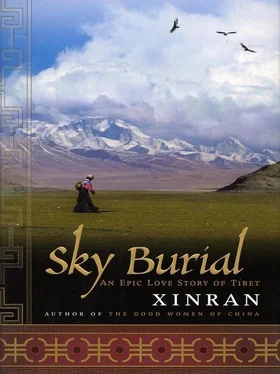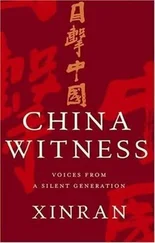At first the military officials she talked to tried to dissuade her from joining the army, but when they heard she was a doctor, they stopped protesting. The army was desperately short of doctors and many of the soldiers in Tibet were suffering from altitude sickness. Her qualifications as a dermatologist made her even more useful: there were many severe cases of sunburn because of the high altitude. It was decided that Wen should set out for Tibet immediately. The urgent need for doctors and her own eagerness to start looking for Kejun as soon as possible made the long training undertaken by her husband an unnecessary luxury.
The day came when Wen was due to leave Suzhou. Her big sister and elderly parents took her to the long-distance-bus station by the river. No one said a word. No one knew what to say. Her sister pressed into Wen’s hand a shoulder bag made of Suzhou silk, without telling her what was inside; her father quietly placed a book inside her newly issued army rucksack; her mother tucked a tear-soaked handkerchief into the appliqué fastening of Wen’s blouse. With tears in her eyes, Wen handed her marriage certificate to her mother. Only a mother could be entrusted with something so important. She gave Kejun’s tea mug and towel to her father, knowing how much he loved his son-in-law. She then gave her sister-who knew all Wen’s secrets-a package containing Kejun’s correspondence and documents, along with their love letters.
Dark, gloomy clouds merged with cooking smoke from the white-walled, gray-tiled local houses and gently enveloped Wen’s family as they watched her climb onto the bus. Through the shuddering picture frame of the bus window, Wen saw her family grow smaller and smaller, and finally disappear from sight. She took her last look at Suzhou: the houses with little bridges over flowing water; the temples on the hillsides overlooking the water; the lush greens of the Yangtze delta. There were red flags everywhere, fluttering in the breeze.
When Wen opened the silk shoulder bag her sister had given her, she found inside five tea-boiled eggs, still warm; two pieces of sesame cake; a bag of pumpkin seeds; a bag of dried sweet-sour turnip slivers; a flask of tea; and a little note, the characters blurred by tears:
My dear little sister,
My heart is heavier than words can say.
Our parents are no longer young and can’t
bear much more sorrow in their lives, so
come back soon. Even if you no longer
have Kejun, you still have us, and we can’t
live without you.
Be safe, take care!
I am waiting for you.
Your sister
The book her father had slipped into her bag turned out to be The Collected Essays of Liang Shiqiu. These essays, with their ability to turn the happenings of everyday life into gems of wisdom, were her father’s favorite reading. He had written an inscription on the title page:
Little Wen,
Just as books are read one word at a time,
roads are taken one step at a time.
By the time you’ve finished reading your
book, you and Kejun will be taking the
road home.
Your mother and father await your return.
Wen folded her sister’s note into a paper crane and, along with a small photograph of Kejun, placed it inside the book as a mark, then wrapped the whole thing in her mother’s handkerchief. She’d been told that private property was forbidden on military expeditions, and so these few precious things were all she had to keep her memories alive.
The bus set off northward, along the Grand Canal, which linked Hangzhou with Beijing, bumping and jolting passengers whose excitement at the prospect of the journey, a rare event in their lives, had soon been replaced by fatigue. Gazing at the still waters of the canal, Wen suddenly remembered something her father once told her: that the 2,400-year-old canal linked the Yangtze, the Yellow River, and many of China’s other rivers, and that all of China’s major rivers flowed west to east and had their source in Tibet. This was her first connection to Kejun, this cold, deep canal, its waters originating in the land of glaciers and snowcapped mountains that had swallowed up her husband. She remembered the intense happiness of her first days of marriage. Early each morning, she had roused her husband gently from his dreams with a cup of green tea by his pillow. Each night, she had been soothed to sleep by his caresses. To be separated even for a moment was painful to them. At work, Wen always carried in the pocket of her hospital coat a message that Kejun had written for her that day:
It’s raining today. Please take an umbrella
and my love. Then I’ll have no need to
worry, no matter where you are, no rain
will soak your body…
Yesterday you coughed twice, so today you
must drink two cups of water, and this
evening I’ll make you a medicinal broth
to clear your lungs. Your health is the heart of
our home…
Wen, don’t worry, the home we talked
about yesterday will come. I will be a good
husband to you, and a good son to your
parents…
Hey, little girl, eat a few more mouthfuls of
food, you’re getting thin! I can’t bear to see
you fade away!
Tears poured down Wen’s face. The middleaged woman in the next seat took Wen’s handkerchief from the front of her blouse and placed it in her hand.
STOPPING AND starting for six days and five nights, the bus made its way northwest through a constant flow of vehicles, animals, and humans, before finally reaching Zhengzhou-a city near the Yellow River and China’s largest railway junction. Wen had been instructed to report to the army base there, then continue her journey by train to Chengdu, and finally enter Tibet by the great Sichuan-Tibet Highway. She had heard that Kejun’s unit had also entered the Tibetan plateau by this complicated route.
On arriving at the bus station, Wen was met by a soldier from the nearby army base. She was warmly welcomed and taken to her quarters. All the arrangements seemed thorough: although the beds in the dormitory were just wooden boards balanced on stools and slept six, the quilts and pillows looked spotless. Compared to the filthy street outside the window with its whirlwind of dust and piles of rubbish, it felt like paradise. The soldier sent to meet Wen told her they hardly ever saw any female soldiers-most women they accommodated at the base were family members looking for their men. His comment reminded Wen that she was now a member of the People’s Liberation Army, and no longer an ordinary civilian.
Behind a curtain of woven straw, Wen had a refreshing cold wash. She then changed into the uniform that had been waiting for her. As she tidied her hair, using a tiny shard of broken mirror stuck into the curtain, Wen pondered how well organized the army seemed. If it had been able to defeat the leader of the Nationalists, Chiang Kai-shek, why couldn’t it provide her with any information about Kejun?
The mirror was too small to show her what she looked like in her new uniform. She wondered if Kejun would recognize her. Then the accumulated exhaustion of six days of shaking and jolting on the long road overcame her and, even though it was only five o’clock in the evening, she threw herself on the bed and fell into a heavy sleep.
The one and only military reveille that Wen would hear in her entire life summoned her from a sleep so deep that it had left no room even for dreams. Beside her, five still-sleeping women lay sprawled over the bed. They weren’t wearing uniforms. Maybe they were administrative workers or women come to search for their relatives, thought Wen. When she sat up, another body rolled into the space she had left. No one else had been disturbed by the bugle, even though it went on for so long. They must have been more exhausted than she was. Not even a bomb would wake them, she thought.
Читать дальше












